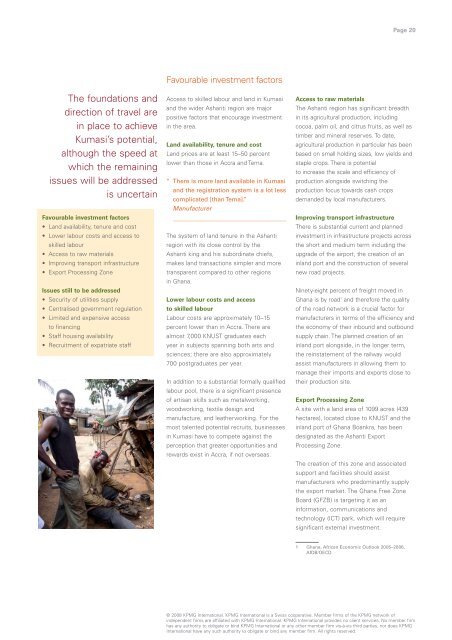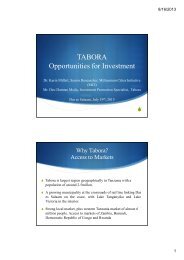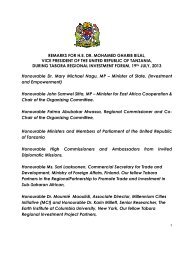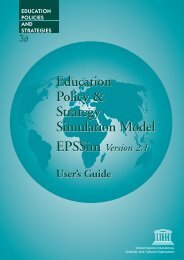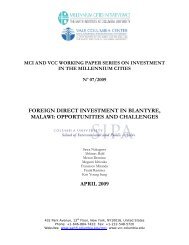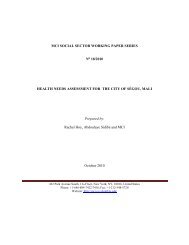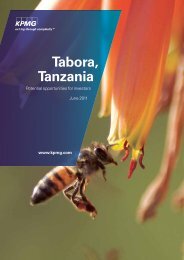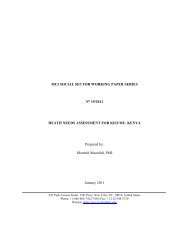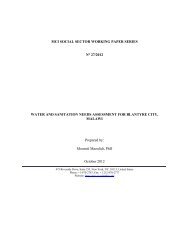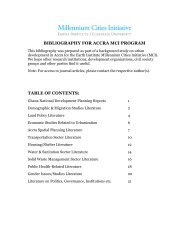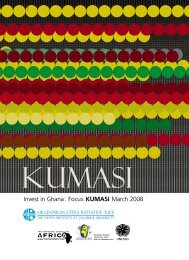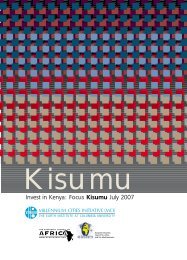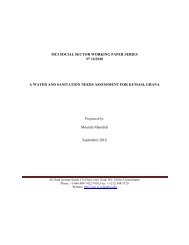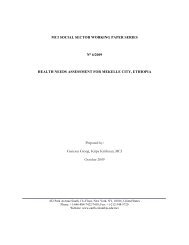Kumasi, Ghana: Potential Opportunities for Investors - Millennium ...
Kumasi, Ghana: Potential Opportunities for Investors - Millennium ...
Kumasi, Ghana: Potential Opportunities for Investors - Millennium ...
You also want an ePaper? Increase the reach of your titles
YUMPU automatically turns print PDFs into web optimized ePapers that Google loves.
The foundations and<br />
direction of travel are<br />
in place to achieve<br />
<strong>Kumasi</strong>’s potential,<br />
although the speed at<br />
which the remaining<br />
issues will be addressed<br />
is uncertain<br />
Favourable investment factors<br />
• Land availability, tenure and cost<br />
• Lower labour costs and access to<br />
skilled labour<br />
• Access to raw materials<br />
• Improving transport infrastructure<br />
• Export Processing Zone<br />
Issues still to be addressed<br />
• Security of utilities supply<br />
• Centralised government regulation<br />
• Limited and expensive access<br />
to financing<br />
• Staff housing availability<br />
• Recruitment of expatriate staff<br />
Favourable investment factors<br />
Access to skilled labour and land in <strong>Kumasi</strong><br />
and the wider Ashanti region are major<br />
positive factors that encourage investment<br />
in the area.<br />
Land availability, tenure and cost<br />
Land prices are at least 15–50 percent<br />
lower than those in Accra and Tema.<br />
“ There is more land available in <strong>Kumasi</strong><br />
and the registration system is a lot less<br />
complicated [than Tema].”<br />
Manufacturer<br />
The system of land tenure in the Ashanti<br />
region with its close control by the<br />
Ashanti king and his subordinate chiefs,<br />
makes land transactions simpler and more<br />
transparent compared to other regions<br />
in <strong>Ghana</strong>.<br />
Lower labour costs and access<br />
to skilled labour<br />
Labour costs are approximately 10–15<br />
percent lower than in Accra. There are<br />
almost 7,000 KNUST graduates each<br />
year in subjects spanning both arts and<br />
sciences; there are also approximately<br />
700 postgraduates per year.<br />
In addition to a substantial <strong>for</strong>mally qualified<br />
labour pool, there is a significant presence<br />
of artisan skills such as metalworking,<br />
woodworking, textile design and<br />
manufacture, and leatherworking. For the<br />
most talented potential recruits, businesses<br />
in <strong>Kumasi</strong> have to compete against the<br />
perception that greater opportunities and<br />
rewards exist in Accra, if not overseas.<br />
Page 20<br />
Access to raw materials<br />
The Ashanti region has significant breadth<br />
in its agricultural production, including<br />
cocoa, palm oil, and citrus fruits, as well as<br />
timber and mineral reserves. To date,<br />
agricultural production in particular has been<br />
based on small holding sizes, low yields and<br />
staple crops. There is potential<br />
to increase the scale and efficiency of<br />
production alongside switching the<br />
production focus towards cash crops<br />
demanded by local manufacturers.<br />
Improving transport infrastructure<br />
There is substantial current and planned<br />
investment in infrastructure projects across<br />
the short and medium term including the<br />
upgrade of the airport, the creation of an<br />
inland port and the construction of several<br />
new road projects.<br />
Ninety-eight percent of freight moved in<br />
<strong>Ghana</strong> is by road1 and there<strong>for</strong>e the quality<br />
of the road network is a crucial factor <strong>for</strong><br />
manufacturers in terms of the efficiency and<br />
the economy of their inbound and outbound<br />
supply chain. The planned creation of an<br />
inland port alongside, in the longer term,<br />
the reinstatement of the railway would<br />
assist manufacturers in allowing them to<br />
manage their imports and exports close to<br />
their production site.<br />
Export Processing Zone<br />
A site with a land area of 1099 acres (439<br />
hectares), located close to KNUST and the<br />
inland port of <strong>Ghana</strong> Boankra, has been<br />
designated as the Ashanti Export<br />
Processing Zone.<br />
The creation of this zone and associated<br />
support and facilities should assist<br />
manufacturers who predominantly supply<br />
the export market. The <strong>Ghana</strong> Free Zone<br />
Board (GFZB) is targeting it as an<br />
in<strong>for</strong>mation, communications and<br />
technology (ICT) park, which will require<br />
significant external investment.<br />
1 <strong>Ghana</strong>, African Economic Outlook 2005–2006,<br />
AfDB/OECD<br />
© 2008 KPMG International. KPMG International is a Swiss cooperative. Member firms of the KPMG network of<br />
independent firms are affiliated with KPMG International. KPMG International provides no client services. No member firm<br />
has any authority to obligate or bind KPMG International or any other member firm vis-à-vis third parties, nor does KPMG<br />
International have any such authority to obligate or bind any member firm. All rights reserved.


